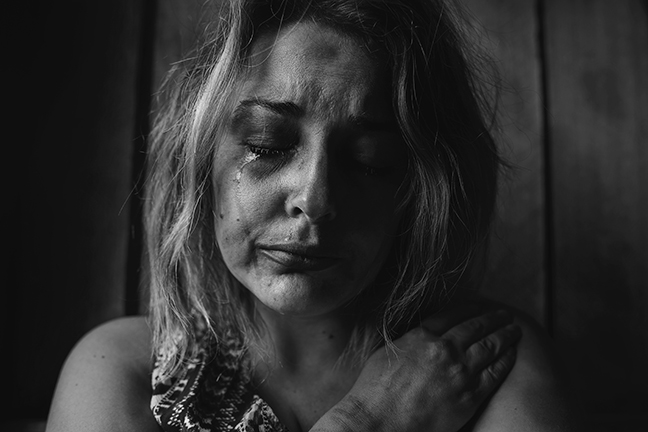Haley Horstman Studies Difficult Experiences Through Storytelling

Storytelling helps heal wounds from loss.
Miscarriage research extends beyond mother’s pain
Haley Horstman uses her expertise as a researcher and communication specialist to help people make sense of difficult experiences, using narrative theories to study family stories and storytelling.
Horstman, who is an associate professor and the director of international programs in the College of Arts and Science Communication Department, has published nearly 30 journal articles and 10 book chapters. More are in the works or under review. One of her specialties is helping families cope with miscarriage.
Recently, she was asked by Psychology Today to write a monthly blog on her research. In another instance, a Washington Post contributor, Charles Feng, wrote his story on miscarriage after reading research by Horstman on men coping with pregnancy loss.
“When someone (outside of academia) reads your work and writes about it, it is really exciting,” Horstman says.
Her Psychology Today blog will include her research on miscarriage and communication, which she has been doing since 2013 with colleague Amanda Holman from Creighton University. Both finished their PhDs together at the University of Nebraska-Lincoln.
“Around the time we were graduating, we had a bunch of close contacts who had miscarriages,” Horstman explains. “We talked about how to support them and their romantic partners and realized there was very little research on that…. The non-miscarrying partner doesn’t have a whole lot of support or scripts on how to cope with miscarriage.”
That’s when Horstman decided to focus her research on how couples communicate to make sense of and deal with miscarriage.

Men need to express emotions after miscarriage, too.
Writing Helps
In her research, Horstman often studies how people create, write, and tell stories to cope with their difficult experiences. In one study, she and Holman asked spouses to separately write the story of their miscarriage. Then they compared how similar or different their stories were from each other.
“In that study, we found that when the emotional tenor of stories was similar, it indicates the couple was coping similarly with miscarriage. But it is also important that the husband had space to write his own story. So, content didn’t need to be the same. (Our research) tells us that men in heterosexual marriages need to cope too, and create their own stories.”
Men in general rely a lot on traditional metaphors of masculinity. They assumed the pregnancy would be easy and go smoothly, which is the assumption everyone makes. - Haley Horstman
Horstman also conducted qualitative interviews with men whose partners had miscarriages, looking for metaphors they used to make sense of the situation.
“Men in general rely a lot on traditional metaphors of masculinity,” she says. “They assumed the pregnancy would be easy and go smoothly, which is the assumption everyone makes.”
But after the miscarriage, they stuffed their own feelings to be the rock for their partners, she adds. “Being stoic and dependable is important. But it stifles men from being able to work through their feelings as it relates to miscarriage.
“A lot (of participants) said, ‘I’ve never shared this story, never talked about it.’ … Men in particular don’t have the space to talk and cope.”

The pain of miscarriage is all too real.
Feeling the Pain
Horstman says when she started reading transcripts in 2013 from the stories of research participants, it brought her own emotions to the forefront through the pain others endured. “People were suffering and a lot of people really poured their hearts out in those stories they wrote for us.”
Horstman is also working on international research with families in South Africa who told stories of enduring apartheid, a systematic government-sponsored segregation act that separates white people from people of color that ended in 1994. She’s interested in how these stories demonstrated South Africans’ resilience and how they passed on that resilience to their children.
This focus on intergenerational resilience and storytelling will be a focus in her upcoming research in international families, including Palestinian refugees families (with graduate student Amnee Elkhalid) and Polish families under a Fulbright Award starting in Fall 2021. For this project, she will be living in Warsaw, Poland for ten months and studying the unique qualities of family resilience and storytelling in Central and Eastern Europe. “I want to create interventions to help people (of different minority groups and different cultures) process their difficult experiences through stories and storytelling.”
I want to show people that their communication matters. Interpersonal and family communication really makes a difference in their lives and health. That’s my overarching goal to use my research to help others improve their life through communication. - Haley Horstman
Other areas of research include a project with Drs. Maria Butauski (MU PhD, 2019) and Nicole Hudak on how people in queer relationships make sense of miscarriage. “Most research on miscarriage is on heterosexual couples,” Horstman says, which limits what we know about unique communication and coping constraints and patterns in all other relationships. She is currently collecting data on this project.
Horstman, whose advice to others achieving their career goals, is to study something meaningful and intrinsically valuable to them. What she doesn’t do: Tell people how to write their stories. “There are benefits of just getting pen to paper,” she says. “In trying to work through difficult experiences, just writing about it and getting it off their chests is very therapeutic.
“I want to show people that their communication matters. Interpersonal and family communication really makes a difference in their lives and health. That’s my overarching goal to use my research to help others improve their life through communication.”